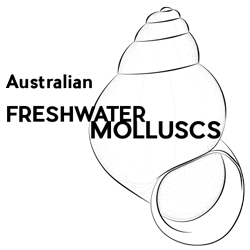
This is one of several species of Austropyrgus found in the southern half of New South Wales. They are all very similar, being separated on small differences in size and shape of the shells and in anatomical details. They have elongate-conic shells with adults having a slightly thickened aperture and the operculum bears several pegs. Most species of Austropyrgus are geographically isolated and have restricted ranges.
A. sparsus is similar to the other species in southern NSW and eastern Victoria except except A. synoria. It differs from A. tathraensis, A. abercrombiensis and A. dekeyzeri in not possessing a distinctly reflected outer lip. The shell can be separated from A. buchanensis by its more convex whorls and from A. abercrombiensis by its broader shape.
Austropyrgus sparsus (Iredale, 1944)
Class Gastropoda
Infraclass Caenogastropoda
Order Littorinida
Suborder Rissoidina
Superfamily Truncatelloidea
Family Tateidae
Genus Austropyrgus Cotton, 1942
Original name: Potamopyrgus sparsus Iredale, 1944. In Iredale, T. (1944). Guide to the freshwater shells of New South Wales, class Gastropoda, part II. Australian Naturalist 11(5): 113-127.
Type locality: Braidwood, New South Wales.
In streams on water weeds, hard substrata (rocks etc.) and crawling on litter and sediment. Can be locally abundant. Assumed to feed by scraping bacteria and microalgae. Presumed solitary capsules with single egg. Direct development.
This species is known from a number of small streams around the Braidwood area of southern New South Wales.
Most species of Austropyrgus are geographically isolated and have restricted ranges, and this one is no exception.
Clark, S. A., Miller, A. C. & Ponder, W. F. (2003). Revision of the snail genus Austropyrgus (Gastropoda: Hydrobiidae): a morphostatic radiation of freshwater gastropods in southeastern Australia. Records of the Australian Museum 28: 1–109.
Iredale, T. (1944). Guide to the freshwater shells of New South Wales. class Gastropoda, part II. Australian Naturalist 11: 113–127.